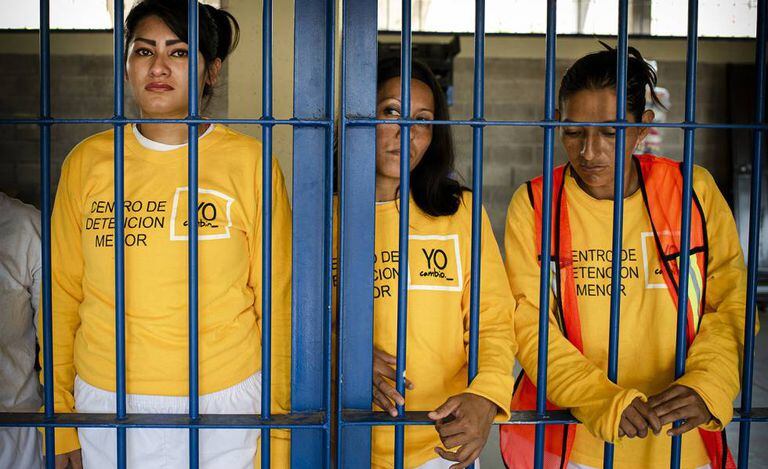Three detainees in the Izalco prison (El Salvador), in an image from May 2019.Kasia Strek
Women imprisoned for having suffered obstetric emergencies in El Salvador - penalized under the crime of homicide by miscarriage - have been denied seeing their families with the excuse of the pandemic.
For at least nine months, the human rights organizations that follow their cases have been asking the country to take urgent measures to guarantee their rights, but the State has not listened to them.
This Thursday, before the Inter-American Commission on Human Rights (IACHR) they again expose what the detainees are suffering in the Central American country.
It has been impossible for there to be distancing in the prisons of El Salvador, which are among the most overcrowded in the world, and the alteration in the visiting regime - which is the way in which some receive hygiene items and medicines - has worsened the conditions of detention. these women, many unjustly detained, says Morena Herrera, president of the Citizen Group for the Decriminalization of Abortion.
"In these months of pandemic we have asked that their cases be studied and that they be granted conditional release, but they have not wanted to listen to us," he denounces.
The claims of human rights groups have not been addressed and a ruling of the Constitutional Court of El Salvador has not been complied with, which last July ordered an urgent review of the files of 14 women detained for having an abortion, indicating what their conditions of employment are. health and explain why they have been prohibited from communicating with their families.
"Undue restrictions on the visitation regime or coercive solitary confinement can constitute forms of cruel, inhuman or degrading treatment," said the court, which questioned the ineffectiveness of the judicial system in the face of requests for those who have served the necessary time in prison. to achieve prison benefits.
Carmen Martínez, regional manager for Latin America and the Caribbean of the Center for Reproductive Rights, says that since the Court responded to a legal action - brought, among others, by her organization - that asked to contemplate the freedom of 14 prisoners, “it has not nothing happened ”, despite the fact that there was a period of just a few days after the sentence was issued to comply with the justice requests.
"If his freedom was not granted, it should be argued, and with weighty grounds, but nothing has happened," he insists.
The prison population in El Salvador has increased from 7,800 in 2000 to more than 36,600 this year, and the IACHR has already shown its concern about what is going on in prisons in that country.
In December 2019, he assured that, after a visit, he had found “serious human rights violations”.
Last April he warned about the risk to which the detainees were exposed with the measures that were being decreed to stop the covid-19.
This Wednesday, the IACHR has once again set its eyes on the prisons of El Salvador, particularly on the situation of women.
"We have proposed that the gender approach be included because in this country many are prosecuted without having committed any crime, for health problems such as an obstetric complication," says Morena Herrera.
Advocating for the freedom of these women is dealing with a system that seems unwilling to listen and with harassment from those who oppose seeing them outside of prisons.
Herrera says that this year there have been weeks in which the digital platforms of the organization he leads have been the target of at least 13 hacking attempts and days in which up to 40 people have stopped at the door of the institution to pray and reproach them , Bible in hand, the work they do for the detainees.
El Salvador is one of the six countries in Latin America where abortion is criminalized in all circumstances.
It has one of the hardest judicial systems with women, who end up being persecuted by a justice that does not understand complications during pregnancy and condemns them with sentences of up to 40 years.
"Now more than ever, especially in a pandemic that puts life at risk, we urge the IACHR to continue advocating and pressuring El Salvador to free these unjustly imprisoned women," Herrera asks once again.

